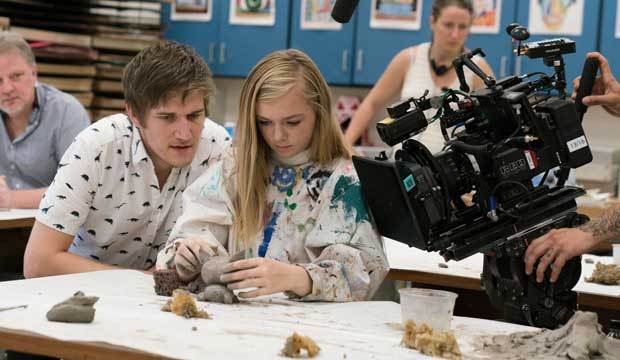On-screen vs. real life
How the movie industry is changing the outlook on teenagers experiences
Bo Burnham, director of the “coming of age” film “Eighth Grade,” helps direct actress Elsie Ficher in a scene portraying “coming of age” events.
Growing up is a hard time for many teenagers, especially when they begin to hit their high school years. They are faced with many obstacles that include friendship, relationships, schoolwork and on top of it all, they begin to realize that adulthood is about to hit in the next couple of years. While these paths are completely different for each and every individual, many share the same similarities throughout.
“Coming-of-age” movies are striking teenagers’ attention, but are beginning to give false depictions of teenagers actuarial portrayals. Movies like “Eighth Grade”, “Mean Girls” and “The Edge of Seventeen” have a healthy mix of both good and bad representations of teenagers’ perspective.
“Eighth Grade” is a comedy-drama film written and produced by comedian Bo Burnham and was released in mid-July of 2018. This film features a female protagonist named Kayla Day, played by actress Elsie Fischer, that focuses on how she endures suburban adolescence as she makes her way through her last two weeks of middle school.
Kayla is faced with many teenagers’ obstacles that included being overlooked, her appearance and overall present-day students struggle with the rise of social media. Like many teenagers today, Kayla takes to social media to express her thoughts and feelings, particularly through her YouTube channel. On the other hand, Kayla also faced many experiences that teens, like myself, have never experienced at that age.
One possible reason for this inaccurate portrayal is due to the fact that it is written and directed by a male. Burnham, who was one of YouTube’s first prominent comedians, wrote the film to battle his own anxiety in a setting that is known to be anxiety-provoking: middle school. While many news outlets first reported this to be the most accurate portrayal of eighth grade or teen years in general on-screen, I find it to be a healthy mixture.
Some scenes of Kayla dealing with the constant pressure of her father and his yearning to be included in her day-to-day life reflect my own relationship with my parents around this age. Other scenes, such as an awkward car ride from the mall involving peer pressure, felt a little too far-fetched and seemed like an event that may occur later in a student’s life, if at all.
Had “Eighth Grade” been directed by a female, such as “The Edge of Seventeen”, I feel like a better representation would have been shown on screen. This lack of diverse voices is not just limited to teen and coming-of-age films. It is an issue across the entire industry.
According to the website Women and Hollywood, there is currently a fifty-fifty split in male and female audience members. Though women go to the movies the same amount as men, they only directed eight percent of the top 250 films released in North America in 2018. This disconnect is shown on the screen when audiences cannot relate to the stories being told because they lack the proper representation.
“Mean Girls” is a movie most teenagers have watched or heard about as they have grown up. Since 2004, this movie has been an eye-catcher for young kids that look up to this movie as an experience they will encounter later on in their life as they grow up. While “Mean Girls” has some incidents that portray real-life events that occur during a teenager’s life, there are many that falsely portray teenagers’ experiences. While watching this movie, you see how students are being “classified” into groups based upon their friendships and their overall characteristics.
While many have a different opinion on this matter, I believe that “classifying” students is not an action that happens in high school. I look at everyone as being equal and having special, unique qualities that set them apart from the person they are next too. I do not look at them and immediately “classify” them into a group because of the people they hang out with or their beliefs. “Mean Girls” used classification as a bias and I feel it is something that most high school students do not go through as they are growing up.
“The Edge of Seventeen”, a coming-of-age comedy-drama, was written and directed by a female, Kelly Fremon Craig. This film, unlike the others, has a positive representation of “coming-of-age” teenagers. Featuring actress Hailee Steinfeld as Nadine, this film focuses on the topic of finding yourself, which is a huge aspect that nearly every teenager goes through at this vulnerable point in their lives. Nadine was faced with many obstacles, like losing her best friend, gaining new friends and trying to eventually find the people who matter the most in her life that will stick by her side throughout the rest of her time here on Earth. The protagonist may have had many heartbreaks, but she was able to bounce back and never missed a beat while doing so.
“Coming-of-age” films are blooming in the movie industry right now, but are student’s perspectives and experiences actually being portrayed in a meaningful matter, or are these directors leading individuals in the wrong direction?



